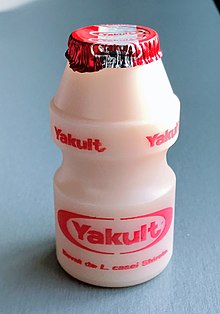Probiotic
Probioticele sunt microorganisme care oferă efecte benefice în momentul în care sunt consumate prin alimentație, având un efect de îmbunătățire a unor simptome digestive și de refacere a florei intestinale benefice pentru organism.[1][2][3] Probioticele pot fi utilizate în siguranță pentru consumul uman, însă în unele cazuri pot produce manifestări sau interacții nedorite. [4][5][6]

În anumite studii clinice, unele probiotice s-au dovedit a fi folositoare în tratamentul unor condiții medicale specifice, cum ar fi diareea indusă de tratamentul cu antibiotice la copii[7] și infecțiile cauzate de Clostridium difficile la adulți.[8] O problemă legată de consumul oral de probiotice este faptul că acestea pot fi inactivate de mediul puternic acid al stomacului. De aceea, începând cu anii 2010, au fost formulate diverse tehnici de micro-încapsulare pentru rezolvarea acestor probleme.[9]
Istoric
modificareAlimente
modificareCulturile vii de probiotice se regăsesc în diverse produse lactate fermentate și alte produse alimentare fermentate.
Unele produse fermentate care conțin bacterii producătoare de acid lactic sunt: murăturile,[10] kimchi,[10][11] pao cai,[12] și varza murată;[13] produsele derivate din soia precum tempeh,[14] miso,[15] și sosul de soia;[16] și produsele lactate precum iaurtul, kefirul,[17] și laptele bătut.[18]
Note
modificare- ^ „Probiotics: In Depth”. National Center for Complementary and Integrative Health, US National Institutes of Health. . Accesat în .
- ^ Hill, C; Guarner, F; Reid, G; Gibson, GR; Merenstein, DJ; Pot, B; Morelli, L; Canani, RB; Flint, HJ; Salminen, S; Calder, PC; Sanders, ME (august 2014). „Expert consensus document. The International Scientific Association for Probiotics and Prebiotics consensus statement on the scope and appropriate use of the term probiotic”. Nature Reviews. Gastroenterology & Hepatology. 11 (8): 506–14. doi:10.1038/nrgastro.2014.66. PMID 24912386.
- ^ Rijkers GT, de Vos WM, Brummer RJ, Morelli L, Corthier G, Marteau P (). „Health benefits and health claims of probiotics: Bridging science and marketing”. British Journal of Nutrition. 106 (9): 1291–6. doi:10.1017/S000711451100287X. PMID 21861940.
- ^ Doron S, Snydman DR (). „Risk and safety of probiotics”. Clin Infect Dis (Review). 60 Suppl 2: S129–34. doi:10.1093/cid/civ085. PMC 4490230 . PMID 25922398.
- ^ Singhi SC, Kumar S (). „Probiotics in critically ill children”. F1000Res (Review). 5: 407. doi:10.12688/f1000research.7630.1. PMC 4813632 . PMID 27081478.
- ^ Durchschein F, Petritsch W, Hammer HF (). „Diet therapy for inflammatory bowel diseases: The established and the new”. World J Gastroenterol (Review). 22 (7): 2179–94. doi:10.3748/wjg.v22.i7.2179. PMC 4734995 . PMID 26900283.
- ^ Goldenberg, Joshua Z.; Lytvyn, Lyubov; Steurich, Justin; Parkin, Patricia; Mahant, Sanjay; Johnston, Bradley C. (). „Probiotics for the prevention of pediatric antibiotic-associated diarrhea”. The Cochrane Database of Systematic Reviews (12): CD004827. doi:10.1002/14651858.CD004827.pub4. ISSN 1469-493X. PMID 26695080.
- ^ McFarland LV (). „Meta-analysis of probiotics for the prevention of antibiotic associated diarrhea and the treatment of Clostridium difficile disease”. Am. J. Gastroenterol. 101 (4): 812–22. doi:10.1111/j.1572-0241.2006.00465.x. PMID 16635227.
- ^ Islam MA, Yun CH, Choi YJ, Cho CS (). „Microencapsulation of live probiotic bacteria” (PDF). Journal of Microbiology and Biotechnology. 20 (1367–1377): 1367–1377. doi:10.4014/jmb.1003.03020. PMID 21030820.
- ^ a b Breidt F, McFeeters RF, Perez-Diaz I, Lee CH (). „Fermented Vegetables” (PDF). Fermented Vegetables; In: Food Microbiology: Fundamentals and Frontiers, 4th Ed. Washington, DC: ASM Press. pp. 841–855. doi:10.1128/9781555818463.ch33. ISBN 978-1-55581-626-1. Accesat în .
- ^ Oh CK, Oh MC, Kim SH (). „The Depletion of Sodium Nitrite by Lactic Acid Bacteria Isolated from Kimchi”. Journal of Medicinal Food. 7 (1): 38–44. doi:10.1089/109662004322984680. PMID 15117551.
- ^ Pederson CS, Niketic G, Albury MN (). „Fermentation of the Yugoslavian pickled cabbage”. Applied Microbiology. 10 (1): 86–9. PMC 1057814 . PMID 14484853.
- ^ Friedman, Y; Hugenholtz, Jeroen; De Vos, Willem M.; Smid, Eddy J. (). „Safe use of genetically modified lactic acid bacteria in food. Bridging the gap between consumers, green groups, and industry”. Electronic Journal of Biotechnology. 9 (4): E49–55. doi:10.2225/vol9-issue4-fulltext-12. Accesat în .
- ^ Moreno MR, Leisner JJ, Tee LK, Ley C, Radu S, Rusul G, Vancanneyt M, De Vuyst L (). „Microbial analysis of Malaysian tempeh, and characterization of two bacteriocins produced by isolates of Enterococcus faecium”. Journal of Applied Microbiology. 92 (1): 147–157. doi:10.1046/j.1365-2672.2002.01509.x. PMID 11849339.
- ^ Ehrlich, Steven D. (). „Lactobacillus acidophilus”. University of Maryland Medical Center (UMMC). Accesat în .
- ^ Tanasupawat S, Thongsanit J, Okada S, Komagata K (). „Lactic acid bacteria isolated from soy sauce mash in Thailand”. Journal of General and Applied Microbiology. 48 (4): 201–209. doi:10.2323/jgam.48.201. PMID 12469319.
- ^ Plessas S, Alexopoulos A, Voidarou C, Stavropoulou E, Bezirtzoglou E (). „Microbial ecology and quality assurance in food fermentation systems. The case of kefir grains application”. Anaerobe. 17 (6): 483–5. doi:10.1016/j.anaerobe.2011.03.014. PMID 21497663.
- ^ Shiby VK, Mishra HN (). „Fermented milks and milk products as functional foods--a review”. Critical Reviews in Food Science and Nutrition. 53 (5): 482–96. doi:10.1080/10408398.2010.547398. PMID 23391015.